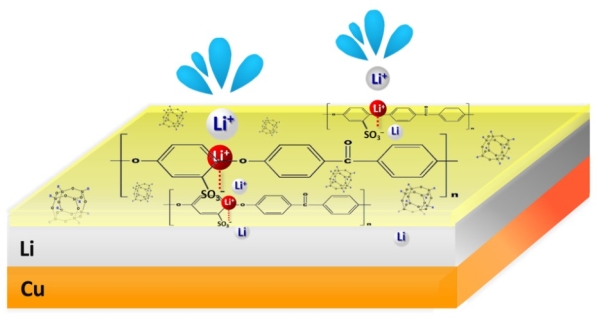Research on Advanced Lithium-ion Battery Technology by Prof. Nae-Lih Wu's Team Highlighted in《Nature Communications》

The green energy industry is listed as a key industry for the country's future development. An important part of the development of renewable energy is the development of cheap and high-capacity energy storage battery systems. The success of the electric vehicle industry also depends on the development of battery technology. Lithium ion batteries are the main battery technology for the foreseeable future. Among them, the development of lithium metal anodes is regarded as the "holy grail" for the development of high-capacity anode materials. Countries around the world are competing to invest considerable research resources on this issue. The main challenges faced by the application of lithium metal anodes are the generation of lithium dendrites and the low Coulomb efficiency. The former is likely to cause hazard due to battery short-circuiting, while the latter causes major problems such as poor battery cycle life.
The research team of Professor Nae-Lih Wu (吳乃立) of the Department of Chemical Engineering has been devoted to the research of safety and long-life lithium-ion battery technology in recent years, and advocates the use of soft film technology as an innovative concept of artificial electrode-electrolyte interphase (ASEI) to control the charge and discharge behaviors of the electrode so as to improve the performance of the battery. Especially in recent years, there have been major advances in the development of lithium metal anode technology. Professor Wu's research team successfully developed micron-scale flexible ASEI in 2018, which was then the thinnest ASEI known in the suppression of lithium dendrite ASEI technology. Reducing the thickness of ASEI can achieve higher energy density. The research results were published in the journal "Advanced Energy Material". Recently, it was revealed in "Nature Communications" that the design of organic-inorganic composite materials was used to develop a nano-layer (<100 nm) ASEI thin layer with high toughness and high temperature stability. The nano-thick ASEI effectively suppresses the formation of lithium metal dendrites and significantly improves the charge-discharge coulombic efficiency even under the operation conditions of high current density and high lithium plating capacity.
In this publication, the team led by Professor Wu and his postdoctoral researcher Dr. Weng Yu-Ting (翁郁婷) completed the design and synthesis of the ASEI material, and combined with the team of Professor Yi Cui (崔屹) from Stanford University to complete the performance analysis of various materials. And through the theoretical analysis of Professor Jyh-Ping Hsu's team in the Department of Chemical Engineering, the mechanism theory of ASEI inhibiting dendrites was first revealed. The research achievements have made important contributions to the development of lithium metal anode technology in both material development and theoretical establishment. This research project is also the output of the Advanced Research Center of Green Materials Science and Technology, National Taiwan University.